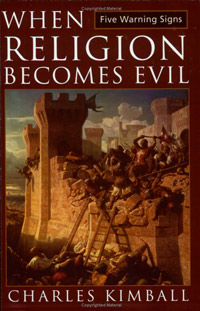By Charles
Kimball
 This is a great introduction to the topic of religious
fundamentalism and its corruption of the original, peaceful aspects of
the world’s many religious traditions. Kimball is a religion professor
and Baptist minister who has championed pluralism for decades and has
extensive experience working for peace in the Middle East – including
being a negotiator during the 1979 Iranian hostage crisis. His background
makes him perfectly suited to examine the trends that ignite religious
conflict and the opposing pathways to peace.
This is a great introduction to the topic of religious
fundamentalism and its corruption of the original, peaceful aspects of
the world’s many religious traditions. Kimball is a religion professor
and Baptist minister who has championed pluralism for decades and has
extensive experience working for peace in the Middle East – including
being a negotiator during the 1979 Iranian hostage crisis. His background
makes him perfectly suited to examine the trends that ignite religious
conflict and the opposing pathways to peace.
Kimball outlines five factors that are found in corrupt, violent religious
groups. In one form or another, many of these factors – absolute
truth claims, blind obedience, establishing the “ideal” time,
the end justifying the means, and declaring holy war – are found
across the globe in Biblical literalism and American Christian fundamentalism,
Wahhabi Islam and terrorist groups, Hindu nationalists in India, and
countless cults and fundamentalist sects. These groups would be shocked
to discover they have more in common with other fundamentalists, often
their arch-enemies, than with tolerant, pluralist moderates.
All of Kimball’s points are dead-on, and this is the best book
I have read on the subject, which vastly interests me. My only hesitation
with the book is its simplicity. Maybe I was expecting more only because
I am already familiar with the topic, but Kimball is clearly addressing
the book to the general public, new to thinking critically about religious
conflict. He seems to re-stress important points and not delve deep enough
into others for my taste. But I can imagine the book being incredibly
helpful to someone who has not been exposed to these thoughts before.
Though much of the book seems introductory and vague, several spots
when Kimball gets specific shine through. Many specific examples, such
as Jim Jones’ cult in the ‘70s, the aforementioned Iranian
hostage situation, the Crusades, and – of course – September
11th, harbor eerie similarities. In order to stress each religion’s
peaceful beginnings, Kimball also provides succinct introductions to
themes within each, especially Islam.
One of Kimball’s strongest points is his emphasis on Christianity
and Islam as particularly prone to violence, since they are missionary
religions that try to convert others. Hinduism and Buddhism, by contrast,
do not necessarily seek exclusivity in their followers’ beliefs,
and are less apt to spawn narrow-minded sects.
Kimball has clearly often rebutted the claim that religion is the cause
of the world’s violence, and presents the best refutation of that
myth I’ve seen in print. Many of the world’s conflicts are
only partly religious in nature, he argues, and are more closely tied
to resource clashes. Many non-religious problems have also been solved
by religious leaders, such as Gandhi and Dr. King. And since religion
is so essential to our humanity, listing violence perpetrated in its
name as a way to decrease its significance is like trying to eliminate
the economy to solve economic problems. Since less religion is not a
feasible goal, the clear solution is to foster a type of religion that
does not allow for violence – religion that harkens back to the
true spirit of its many messengers such as Christ, Moses, Muhammad, and
the Buddha.
Read November 2002